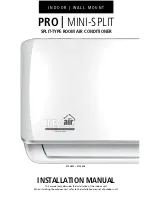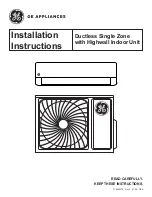
ENGLISH
Insulate each flare connection without gap with field-supplied
insulations to prevent dew condensation. Then insulate each
refrigerant pipe as well.
Fasten securely cord clamps and
the vinyl tape in order to prevent the
pipe from dew condensation
Fix the vinyl tape position at the vertical part
(Insulation for refrigerant pipe (field-supplied)).
Refrigerant pipe
(field-supplied)
Fasten 3 places of the
pipe by cord clamps
(field-supplied)
Insulation for refrigerant pipe
(field-supplied)
Insulation material
(factory-supplied)
Check no clearance between the
indoor unit and the insulation
Unit
side
If coating the optional air panel with a forming agent
(recommended Gupoflex) after installation, make sure that the
forming agent does not contact it. Otherwise, it could cause
a breakage of the panel, resulting in the panel falling. If the
forming agent contacts the air panel, completely wipe it off.
10 DRAIN PIPING
10.1 GENERAL INFORMATION
!
C A U T I O N
•
Do not put the drain pipe for the indoor unit into the drainage trench
where corrosive gases occur. Otherwise, poisonous gases flow into
the room, which may cause poisoning.
•
Do not create an upper-slope or rise for the drain piping, since drain
water will flow back to the unit and leakage to the room will occur
when the unit operation is stopped.
•
Do not connect the drain pipe with sanitary or sewage piping or any
other drainage piping.
•
When the common drain piping is connected with other indoor units,
the connected position of each indoor unit must be higher than the
common piping. The pipe size of the common drain pipe must be
large enough according to the unit size and number of units.
•
Drain piping will require insulating if the drain is installed in a location
where condensation forming on the outside of drain pipe may drop
and cause damage. The insulation for the drain pipe must be selected
to insure vapour sealing and prevent condensation forming.
•
Drain trap should be installed next to indoor unit. This trap must be
designed to good practice and be checked with water (charged)
and tested for correct flow. Do not tie or clamp the drain pipe and
refrigerant pipe together.
?
N O T E
•
Install drainage in accordance with national and local codes.
•
Pay attention to the thickness of the insulation when the left side
piping is performed. If it is too thick, piping can not be installed in
the unit.
10.2 DRAIN PIPE CONNECTION
1
The position of the drain pipe connection is shown below.
36
49
177
Drain pipe connection
2
Prepare a polyvinyl chloride pipe with a 32mm outer
diameter (VP25).
3
Fasten the tubing to the drain hose with an adhesive and the
factory-supplied clamp. The drain piping must be performed
with a down-slope pitch of 1/25 to 1/100.
4
Do not apply excessive force to the drain pipe connection. It
could cause a damage.
5
Connect the factory-supplied drain hose to the drain pipe
connection with the polyvinyl chloride adhesive. When
cleaning the connection surface, applying the adhesive,
inserting, retaining and curing the pipe, refer to information
given by the adhesive manufacturer.
DRAIN PIPING
PMML0477 rev.1 - 10/2017
17












































